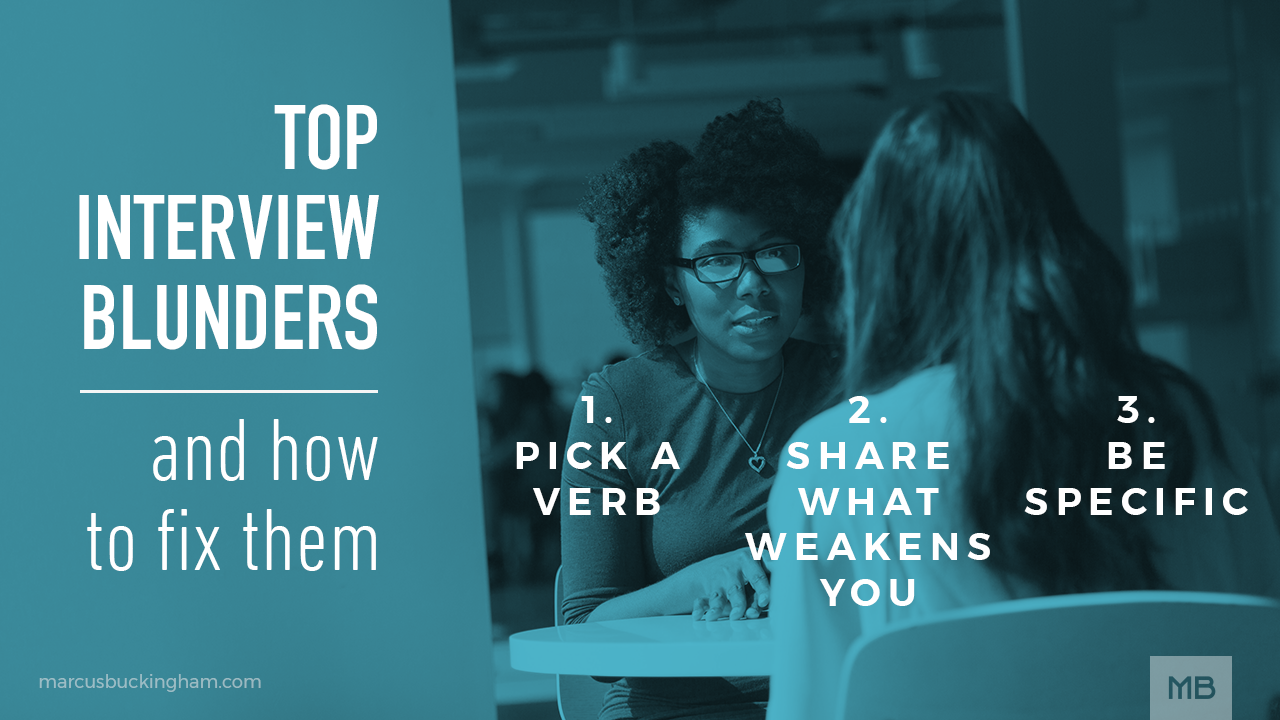Top Interview Blunders
I spent a decade interviewing people to determine the best way to match a candidate’s talent to a specific role. During that time, I noticed what the best interviewees did right – and what a lot of people got wrong. So although I believe it’s always better to focus on where you are strong, here are my top 3 interview blunders that you should stop doing right away, and what you can do instead.
#1 Pick a verb
When someone asks you what your strengths are, do not say, “I love working with people.” You might truly love working with people, but not only is that the most common answer to that question, it’s also the vaguest. Instead, if you want to talk about people, talk specifically about what it is that you love about working with them. Do you like challenging them? Interviewing them? Persuading them? Pick a verb – figure out what you like doing with, to, or for people.
#2 Share what weakens you
When someone asks you to describe a weakness, don’t pull the old “My weakness is that I care too much” hoax. Nobody is buying it. Instead, when you get asked that question, tell your interviewer a particular activity that makes you feel weak. One that you don’t look forward to completing, and that leaves you feeling drained. You don’t have to say that you’re bad at it – you might even, oddly, be good at it. But if it’s a task or a situation that you wouldn’t want to deal with every day, let them know – otherwise, it might end up being your job. We all have things that drag us down, and expressing yours won’t disqualify you for the role (usually – if you hate walking dogs and you’re applying to be a dog walker, it might in this case). Instead, it shows that you’re a thoughtful and curious person about yourself – and that’s always a good thing. When interviewing, be honest about your weaknesses. It shows that you’re thoughtful and curious about yourself. Share on X
#3 Be specific
When your interviewer asks you to “tell me about a time when you overcame resistance to your ideas?” or “tell me about a time when you managed to start a project despite limited resources?” – never say, “Oh, it happens all the time.” They’ve asked you for a specific example for a reason: because they believe that the best predictor of your future behavior is your past behavior. If they’re looking for a specific example of your past behavior, give them one. Don’t make it up – if you’ve never done that before, let them know. But if you have, make sure you tell them when it happened, why it happened, and how you handled it. The best predictor of future behavior is past behavior. In interviews, use specific examples of your past behavior to shine. Share on X

2 Comments
Comments are closed.

Wonderful. It teaches people to be honest which simplies selection of the right candidates thus avoid waste of time and resources
Is there examples of winning interview responses/answers? a link/resources available for the answers that express the good examples.